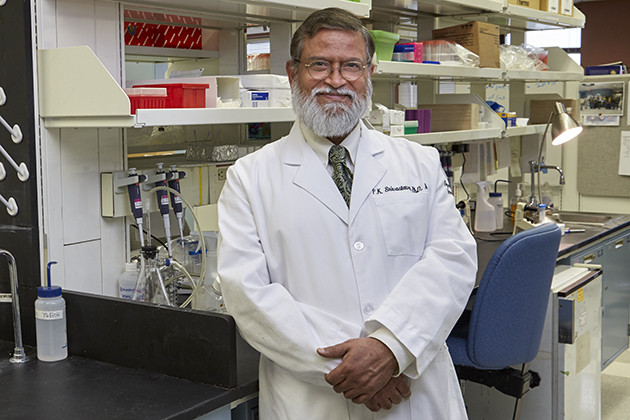
Researchers at the University of Connecticut have found a new way to identify protein mutations in cancer cells. The novel method is being used to develop personalized vaccines to treat patients with ovarian cancer.
“This has the potential to dramatically change how we treat cancer,” says Dr. Pramod Srivastava, director of the Carole and Ray Neag Comprehensive Cancer Center at UConn Health and one of the principal investigators on the study. “This research will serve as the basis for the first ever genomics-driven personalized medicine clinical trial in immunotherapy of ovarian cancer, and will begin at UConn Health this fall,” Srivastava says.
UConn bioinformatics engineer Ion Mandoiu, associate professor of computer science and engineering, collaborated as the other principal investigator for the study, which has been in development for the past four years. The results appear online in the 22 September issue of the Journal of Experimental Medicine.
Dr. Angela Kueck, a gynecological oncologist at UConn Health, will run the initial clinical study, once it is approved by the FDA. The research team will sequence DNA from the tumors of 15 to 20 women with ovarian cancer, and use that information to make a personalized vaccine for each woman.
The researchers focused their clinical trial on patients with ovarian cancer because the disease usually responds well to surgery and chemotherapy in the short term, but often returns lethally within a year or two. That gives researchers the perfect window to prepare and administer the new therapeutic vaccines, and also means they may be able to tell within two years or so whether the vaccine made a difference. If the personalized vaccines prove to be safe and feasible, they’ll design a Phase II trial to test its clinical effectiveness by determining whether they prolong patients’ lives.
Identifying tiny differences
In order for the immune system to attack cancers, it first has to recognize them. Every cell in the body has a sequence of proteins on its exterior that acts like an ID card or secret handshake, confirming that it’s one of the good guys. These protein sequences, called epitopes, are what the immune system ‘sees’ when it looks at a cell. Cancerous cells have epitopes, too. Since cancer cells originate from the body itself, their epitopes are very similar to those of healthy cells, and the immune system doesn’t recognize them as bad actors that must be destroyed.
But just as even the best spy occasionally slips up on the details, cancer cell epitopes have tiny differences or mistakes that could give them away, if only the immune system knew what to look for.
“We want to break the immune system’s ignorance,” Srivastava says. For example, there could be 1,000 subtle changes in the cancer cell epitopes, but only 10 are “real,” meaning significant to the immune system. To find the real, important differences, Mandoiu, the bioinformatics engineer, took DNA sequences from skin tumors in mice and compared them with DNA from the mice’s healthy tissue.
Previous researchers had done this but looked at how strongly the immune system cells bound to the cancer’s epitopes. This works when making vaccines against viruses, but not for cancers. Instead, Srivastava’s team came up with a novel measure: they looked at how different the cancer epitopes were from the mice’s normal epitopes. And it worked. When mice were inoculated with vaccines made of the cancer epitopes differing the most from normal tissue, they were very resistant to skin cancer.
Theoretically, this approach could work for other cancers, although the research has yet to be done.
Researchers in cancer biology, immunology, and computational bioinformatics had to work together to discover these connections. This type of collaboration is the engine driving UConn’s personalized medicine and genomics research, according to UConn’s vice president for research, Jeffrey Seemann.
“This research is a great example of how diverse disciplines create synergy under the umbrella of genomics,” Seemann says. “UConn aims to capitalize on such synergies to make progress in many areas that tap into the genomics realm.”
UConn researchers have applied for two patents for their new technique, and a Connecticut start-up company, Accuragen Inc., in which Srivastava has a financial interest, has obtained an option to license the patents.
Creating a safe, effective cancer vaccine is one of the major long-term goals of personalized medicine. Using a different approach than the one described in this paper, Srivastava’s research has already created a vaccine against kidney cancer, which is in clinical use and commercially available in Russia.
“It is known that patients have genetic sequences that make them better candidates for some drugs than others. And we can figure that out much more easily now than five years ago,” Srivastava says. The novelty of Srivastava’s approach in this new research is that it results in a drug specifically designed for a single person. If the approach proves safe and effective, it would be the ultimate in individualized medicine.
Story Source:
The above story is based on materials provided by University of Connecticut. The original article was written by Kim Krieger. Note: Materials may be edited for content and length.
Journal Reference:
- F. Duan, J. Duitama, S. Al Seesi, C. M. Ayres, S. A. Corcelli, A. P. Pawashe, T. Blanchard, D. McMahon, J. Sidney, A. Sette, B. M. Baker, I. I. Mandoiu, P. K. Srivastava. Genomic and bioinformatic profiling of mutational neoepitopes reveals new rules to predict anticancer immunogenicity. Journal of Experimental Medicine, 2014; DOI: 10.1084/jem.20141308
